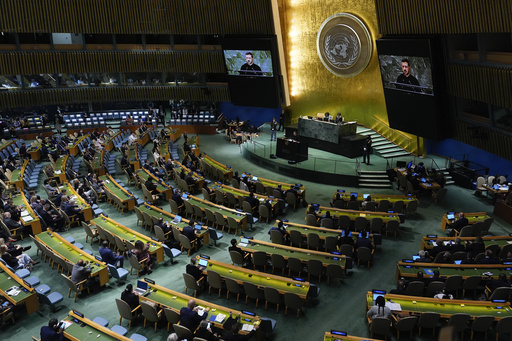UNITED NATIONS — The United Nations General Assembly took a significant stance on the third anniversary of Russia’s invasion of Ukraine by passing a resolution demanding the immediate withdrawal of Russian military forces. This resolution, backed by European countries and supported by Ukraine, presented a setback for the U.S.-backed equivalent, which avoided direct mention of Russian aggression. This decision underscores the evolving dynamics within the 193-member assembly, where resolutions, although not legally binding, are influential indicators of global opinion.
The resolution supporting Ukraine was passed with a vote tally of 93-18 and 65 abstentions. While lower than previous vote counts that had seen over 140 countries condemning Russia’s actions, it still demonstrates substantial support for Ukraine. Nonetheless, it reflects some waning unity, particularly as the U.S. had urged Ukraine to retract their proposal in favor of a U.S.-led resolution, which the Trump administration had attempted to advance with last-minute appeals.
In an unexpected turn, the assembly agreed to incorporate three modifications from European proposals into the U.S. resolution. These adjustments explicated that Russia’s invasion constitutes a violation of the UN Charter. When the amended U.S. proposal was put to a vote, Ukraine voted in favor, the U.S. chose to abstain, and Russia opposed it. This resolution passed with 93 votes in favor, 8 against, and 73 abstentions.
Ukraine’s Deputy Foreign Minister Mariana Betsa emphasized Ukraine’s sovereign right to self-defense, pointing out that Russia’s actions breach the UN Charter’s dictates on sovereignty and territorial integrity. Stressing the critical time elapsed since Russia’s full invasion began, she called on the global community to align with the principles of the Charter and advocate a just, durable peace.
The United States, represented by envoy Dorothy Shea, lamented the continued hostilities and urged for a resolution that encapsulates a global commitment to conclusively end the conflict. Despite existing resolutions castigating Russia, new efforts are being sought to halt the prolonged human suffering inflicted by the continuing conflict.
This divergence in resolutions also highlights the strains between the U.S. and Ukraine, as the Trump administration initiated unexpected negotiations with Russia without consulting European allies and Ukraine. This has intensified disagreements within the transatlantic alliance concerning diplomatic engagement with Russia.
The Trump administration’s divergent approach saw President Trump publicly criticizing Ukrainian President Volodymyr Zelenskyy as a “dictator” and suggesting an expedited resolution be reached, invoking controversy and a spirited rebuttal from Kyiv. Trump’s rhetoric, coupled with the U.S. proposal of a counter-resolution to Ukraine’s, illustrates rising tension amid the conflict’s delicate diplomatic landscape.
As the U.S. seeks support for its resolution within the UN Security Council, where its vote holds more weight, diplomatic maneuvers continue. However, the prospect of a veto by either the U.S. or Russia looms over the council’s proceedings.
The General Assembly has increasingly taken center stage due to the Security Council’s stalemate. Since the February 2022 invasion, the assembly has played a critical role in maintaining international visibility on Ukraine, condemning Moscow’s actions and reiterating demands for an immediate withdrawal of Russian troops.
The original and succinct U.S. resolution acknowledged the loss of life and called for a swift end to hostilities but omitted direct mention of Russia’s invasion. France, in representation of over 20 European countries, proposed amendments effectively calling the situation a “full-scale invasion” and underscoring Ukraine’s territorial integrity per the UN Charter.
Russia’s UN Ambassador Vassily Nebenzia initially deemed the U.S. resolution a positive move, suggesting an amendment to broaden focus on the “root causes” of the conflict. Still, Russia did not favor the amended resolution which placed explicit responsibility on Moscow for instigating the war.
The approved Ukrainian resolution echoes previous assembly positions, calling for Russia’s unequivocal military withdrawal and flagging the potential escalation risks posed by North Korean involvement. Reaffirming Ukraine’s sovereignty, it rejects any territorial gains achieved through force and underscores the urgency of a peaceful resolution to the conflict.


